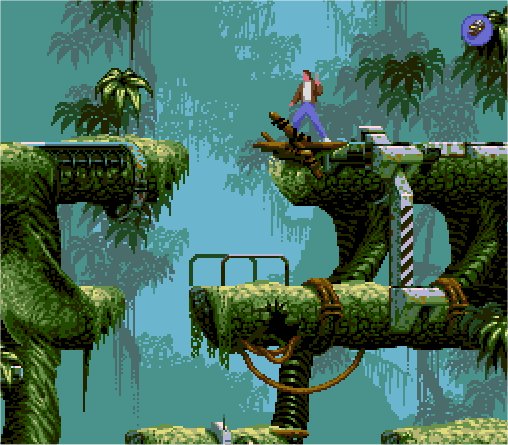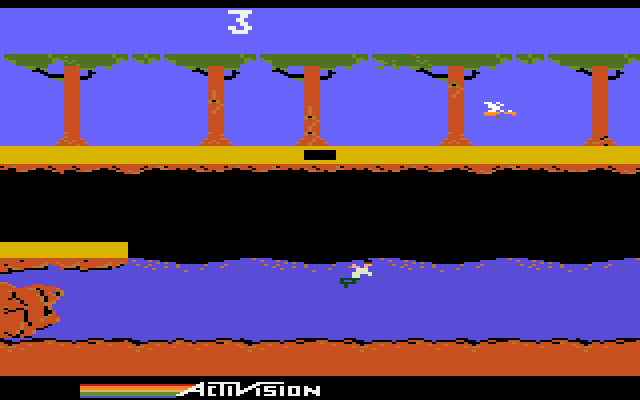I've never read Ender's Game, in spite of having been given a copy by a programmer friend of mine nearly a decade ago, so I've got no idea on how well Shadow Complex embodies the writing and ideas of Orson Scott Card. The game was recommended to me solely on the basis of its similarity to Super Metroid, long hailed as one of the greatest 2D exploration-based games ever made. Shadow Complex is a recent attempt by an indie developer (Chair Entertainment) to resurrect this supposedly long dead style of game. Of course, it's difficult to say this style is dead when Konami releases a new 2D Castlevania--all of which follow the template of Super Metroid so completely they've been affectionately dubbed "Metroidvania"--virtually every year. This is why if Shadow Complex were merely a Metroid clone, like Castlevania, it wouldn't be worthy of note. Thankfully it's much more than that.
I played the game for about an hour last night, and already I've had a dream about it. In the dream I am swimming in the murk of an underground lake. The lake is dark, but I can see some shadows, which I make out to be debris from a man-made platform. The platform is to the left of me, and I am swimming underwater so as not to be seen by the soldiers on the platform, who are looking for me with flashlights. As I swim forward I have the desire to turn left, to move around platform, near where the debris are. But I can't. As I swim toward them my vision darkens, as if the darkness of the water, itself compounded by the darkness of the cave, were weighing on me, pushing me down into the Earth. I can't move to the left. I can't move to the right. I can only move forward, being content to simply watch the mysteries to either side of me pass beyond my sight. I turn on my water-proof flashlight to better see these places I cannot go. The murk is illuminated and I'm in a bubble of feeble light, far beneath the earth, underwater, surrounded by a quiet darkness. For some reason I don't need air. I just float there, in the strange womb of rock and water, thinking to myself quietly, wondering what lies beyond, but equally content just to stay put, feeling my surroundings, until I am ready to explore.

Such are the pleasures of a game like Shadow Complex, and I have not felt them in a long time. They are pleasures I would not necessarily associate with games like Super Metroid, which feel to me less about reflection and more about moving through space. Shadow Complex reminds me a lot more of older exploration-based 2D games, most notably Out of this World, Flashback, and Pitfall II. These games had a sense of stillness that I feel Shadow Complex captures rather well. I'm not entirely sure where it comes from, but I think it has something to do with how the game divides itself into "screens" with discrete challenges, rather than long winding tunnels and paths. Both are fine ways to design a spelunking game, but the former encourages players to parse their mental image of the game world into focused sections, with each representing a single coherent idea. The "underground lake" I dreamed of is just such an example. It is an individual screen the player comes across instantaneously after walking through a door. Like Pitfall and Flashback (and unlike Metroid) screens "cut" between each other in Shadow Complex, creating the decisive impression of leaving one finite space and entering another. The lake, therefore, feels like a single area, not part of a larger area. The fact that I am faced with such a specific space with such specific boundaries encourages me to regard it as a destination rather than a pathway to other places. It is of course a pathway as well, but I'm much more likely to stop and take note of my surroundings, to think "Wow. I just found an underground lake!" than allow my environment to blur past me as I hurry along. Metroid seldomn encouraged this sort of mental orientation towards one's environment, which I think has not only to do with its seamless spacial transitions (which pan, as opposed to cut) but also its tile-based visual design. The environments in games like Flashback or Out of this World were not created out of tiles but were each totally unique pieces of background art. Shadow Complex exhibits the same sense of personality, which gives it a much different psychological atmosphere than a mere Super Metroid clone.
There are no doubt elements cribbed directly from Super Metroid, most obviously the map system and tool-activated backtracking. The gun-based combat, however, seems taken directly from Flashback or Blackthorne and in general has very little to do with the alien-squishing distractions of Metroid. The discreteness of Shadow Complex's spaces has a lot to do with this, for most combat-oriented screens feel like a single playfield in which players are encouraged to think, plan, and execute a complex strategy. Failing because I didn't get my gun out fast enough or because I stuck my head out from behind cover at the wrong moment feel right out of Flashback, as does the stealth-like aspect of enemies not noticing you until you let them. Again the keyword is 'reflection'. Finite playfields in which enemies don't notice you encourage reflection before action, as opposed just barreling forward and reacting to threats as they arise. Unlike the spelunking aesthetics of Metroid, which have remained alive and well in Castlevania, Shadow Complex's more reflective, screen-based approach is one that hasn't been explored in a while. The Prince of Persia remake on XboxLive Arcade that came out a few years ago is the only thing that comes close, and it certainly didn't innovate on this style of game in any significant way. Shadow Complex really seems to be picking up a thread that's been lying dormant since Delphine Software chose to go 3D with their Flashback sequel (the regardlessly excellent and underrated Fade 2 Black) rather than 2D.
 Flashback
|
 Pitfall II
|
The prospect of playing a game where every room is a discrete new space, where every challenge is a two part problem of thought followed by action, where I can stop and think and feel and reflect on each new idea the game presents me; all these things are what make Shadow Complex a welcome experience. Any game that can make me feel that dense feeling of habitation that Out of this World did is alright by me, even if the story is filled with things that give me pause. I have no idea how things are going to turn out in the plot, but so far I'm not crazy about the kidnapped girlfriend (Really? That's the best idea you got?) or the implications that the protagonist's journey will be one of submitting to his militaristic father's worldview. Knowing what little I do about Card, but having heard more than a few times about his allegedly fascist tendencies, I really wonder where such elements are going, even if the game isn't written by him. I doubt, though, that any power-worshiping ideology the game might have would turn out to be something other than amusing to me. You can throw a rock and hit a game of questionable politics, after all. I'm just surprised and delighted that one of these games would let me stop and smell the roses on my way to becoming a superman.






